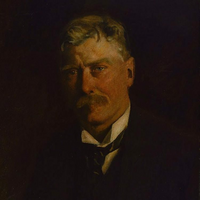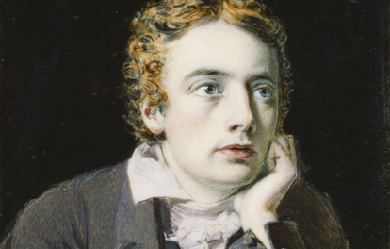The Vigil
THE rain is falling on the roof,
And no sound else disturbs the wife,
Except the trees and winds at strife,
Now near at hand and now aloof;
But listening, leaning evermore,
She waits a knock upon the door.
Her hair is braided round her head;
Her eyes are large and fierce and bright;
Her shapely throat is soft and white;
And on her mouth there burns the red
Of that rich, storied gem that shone
Upon the breast of Prester John.
Upon the couch her husband lies.
How is it that he lies so still?
Why sleeps he there so pale and chill,
The lamplight on his lidded eyes?
Has she not fire, and more than fire
To thrill his flesh with hot desire?
Anon she lifts her rounded arms
As though to feel that she is free;
And her large eyes exultantly
Light up, as when the dawn-glow charms
With roseate lights that gleam and glance
Twin pools to sudden radiance.
The rain is falling on the roof;
Yet, though her ears are open wide,
There is no other sound outside—
No fall of foot, nor tramp of hoof.
And on his couch with lidded eyes
The husband, cold and pallid, lies.
The midnight sky is wild and black
And drenches earth with ceaseless tears;
And now it seems to her she hears
Hoof-strokes upon the sodden track;
And now she rises, sweet as sin,
To let the late night-strayer in.
The lamplight gleams upon his face,
And glistens on his reddened spur;
He stretches out his arms to her
And folds her in a rude embrace. . . .
How can it be the husband lies
So still, with heavy-lidded eyes?
Perchance he neither sees nor hears,
And sleeps unmoved by chance or change.
And yet. . . .and yet, it seems so strange—
If he be dead there should be tears.
Not love nor smiles, nor midnight bliss,
Nor mouths that marry in a kiss.
The loud winds thrust upon the door,
The raindrops plash against the roof,
The trickles from a waterproof
Make little pools upon the floor;
No foe between, no more apart,
They stand, heart throbbing back to heart.
Anon she says: 'He died this morn.
He did not die a whit too soon;
Life’s day, alas, makes towards its noon.
He should have died when love was born.
He should have died long since. And now
Kiss me again—my mouth, my brow!’



